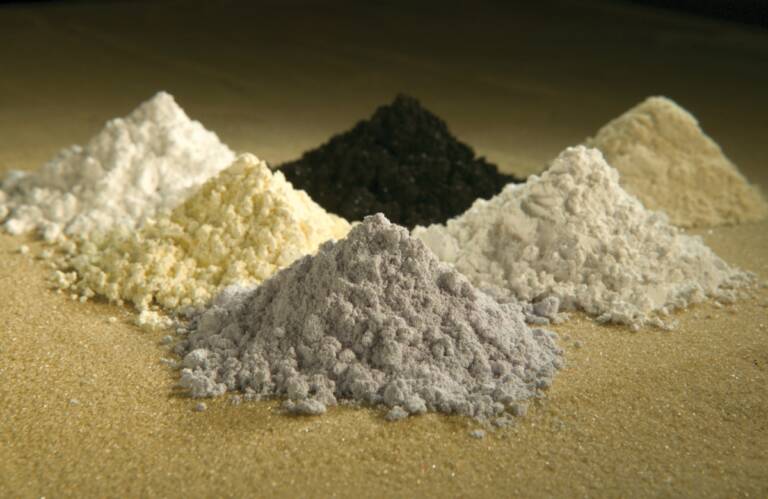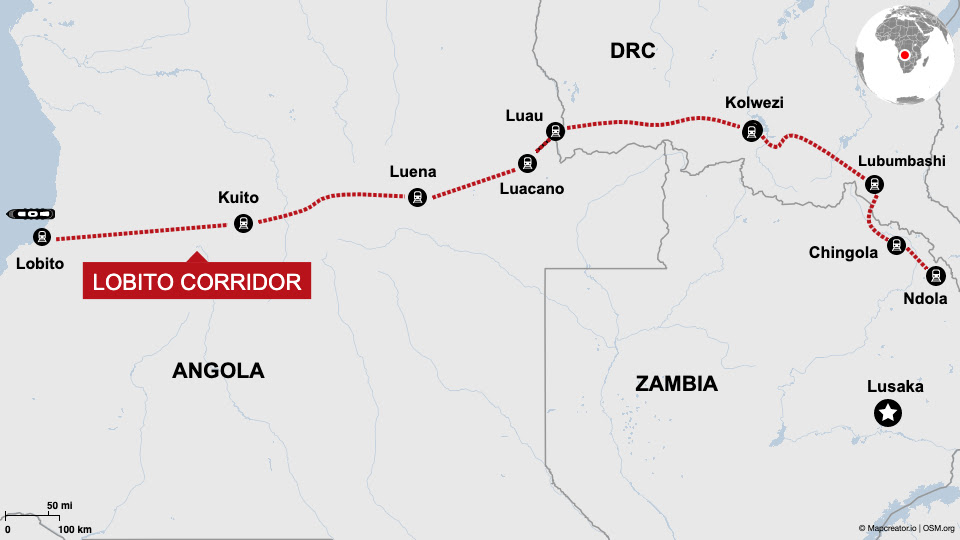USA and Europe against China in the African rare earth arena

As the world transitions to green energy, there is a race to control the mining and refining of vital minerals such as cobalt, lithium and graphite. The current leader in this race is by far China, which controls the majority of the market. But this dominant position is quickly being challenged by the West.
At last month's Global Gateway Forum in Brussels, the European Union made known its intention to challenge China's dominance in the extraction and processing of minerals that power electronics and electric vehicles. In recent months, the United States has also announced several plans to secure supplies of minerals from resource-rich Africa. Will these plans be effective?
In Central Africa, the Democratic Republic of Congo (DRC) supplies more than 70% of the world's cobalt, exported almost exclusively to China. Just south of the DRC, China has made large investments in Zambia, which has one of the world's most valuable copper deposits.
Now both countries are courted by the EU and America .
On the sidelines of the Global Gateway Forum, the EU signed a memorandum of understanding with the DRC and Zambia to develop supply chains for critical and strategic raw materials. A similar agreement was signed with the United States last year.
The EU's Global Gateway strategy, which aims to counter China's trillion-dollar Belt and Road Initiative, plans to mobilize €300 billion ($318 billion) over five years to finance infrastructure in developing countries development.
At the October 25-26 forum, the United States and the European Union also agreed to help Angola, DRC and Zambia develop the “Lobito Corridor,” a transportation link that will connect southern DRC and northwestern Zambia to regional and global trade markets through the Angolan port city of Lobito.
The United States had initially pledged $250 million for a study of the corridor.
According to analysts, the goal is to create a supply chain with a less Chinese footprint. The West could then play ahead by cementing economic and political influence through trade agreements.
But questions remain about the private sector's willingness to finance such projects.
One of the main segments of the Lobito Corridor is Angola's Benguela Railway, a 1,344 km (835 mile) route that connects the port of Lobito to the eastern Angolan town of Luau, on the border with the DRC.
The railway was the main link for the transport of minerals before it was closed during the Angolan civil war of 1975-2002.
But across the border, in the DRC, the tracks are in poor condition and Zambia has no rail connection to the corridor. The agreement with the EU and the US provides for the construction of the Zambia-Lobito rail link.
Chinese companies are also making infrastructure improvements to allow them to easily move minerals to the port. In March, subsidiaries of Jiayou International Logistics and Zijin Mining Group announced a joint investment of $363 million to improve roads and infrastructure between the DRC and Lobito.
Meanwhile, the EU and the US continue to talk about the transport corridor.
“The Lobito transport corridor will also be a game-changer for boosting regional and global trade,” European Commission President Ursula von der Leyen said after signing the MOU in Brussels on October 26.
The US State Department stated that: “The new rail line, connecting northwestern Zambia to the Lobito Atlantic Railway and the Port of Lobito, represents the most significant transportation infrastructure the United States has helped develop on the African continent.” .
At the forum, the EU also signed another agreement, this time with Namibia, on raw material supply chains and renewable hydrogen, supported by investments of one billion euros.
The 27-country bloc will also support a study to develop the port of Walvis Bay, halfway up the Namibian coast, into an industrial and logistics hub for the region.
But China is not taking its eyes off Africa at all. At the Belt and Road Forum in Beijing last month, China announced that it will invest in the second phase of the Kamoa copper and cobalt mine in the Democratic Republic of Congo and the Kururi potash mine project in Eritrea. , as potassium salt has become a key value-added material for lithium-metal batteries.
Christian-Geraud Neema, a Congolese mining and political analyst, said the United States and the European Union are working to build and develop new supply chains and routes to serve their markets.
“The goal would be to have a supply chain with less of a Chinese footprint or influence,” Neema said of the Lobito Corridor deal. But this corridor would only make sense if cobalt and copper suppliers were first found in the DRC and Zambia, he added.
Since the DRC is refining copper, currently listed as a critical mineral by the EU and the US, the Lobito Corridor would be useful for delivering supplies directly to Europe.
The utility would increase significantly if the DRC developed a robust cobalt processing industry, as Europe lacks this capacity. It would be in the interest of European countries for this infrastructure to be developed directly in Congo, in order to obtain material ready for production, not raw minerals.
Gyude Moore, a senior policy fellow at the Center for Global Development in Washington and a former minister of Liberia, said China's dominance of the region's mining and transportation sectors means the West is playing catch-up, so the Corridor of Lobito represents an important opportunity for the West.
“Fundamentally, this is a race to lead the transition to net zero and the new economy that will result from it. Access to these minerals will determine victory and defeat, and in this context it goes beyond simple opposition to the Belt and Road Initiative.”
Carlos Lopes, a professor at the Nelson Mandela School of Public Governance at the University of Cape Town, said China's early and comprehensive involvement in Africa allowed it not only to secure critical minerals but also to establish economic influence and politics through trade agreements, investments and infrastructure development.
This strategic advantage puts the United States at risk of continuing to depend on China as an intermediary in the supply chain for critical minerals.
“The Lobito Corridor could play a critical role in providing a more direct route for transporting minerals from the DRC to the Angolan coast, reducing dependence on what are perceived as Chinese-controlled routes,” Lopes said.
“Overall, these initiatives to counter China’s Belt and Road Initiative ignore the African desire to add value and reduce dependence on raw materials.”

Thanks to our Telegram channel you can stay updated on the publication of new Economic Scenarios articles.
The article USA and Europe against China in the African rare earths scene comes from Economic Scenarios .
This is a machine translation of a post published on Scenari Economici at the URL https://scenarieconomici.it/usa-ed-europa-contro-la-cina-nello-scacchiere-africano-delle-terre-rare/ on Mon, 06 Nov 2023 11:00:45 +0000.

